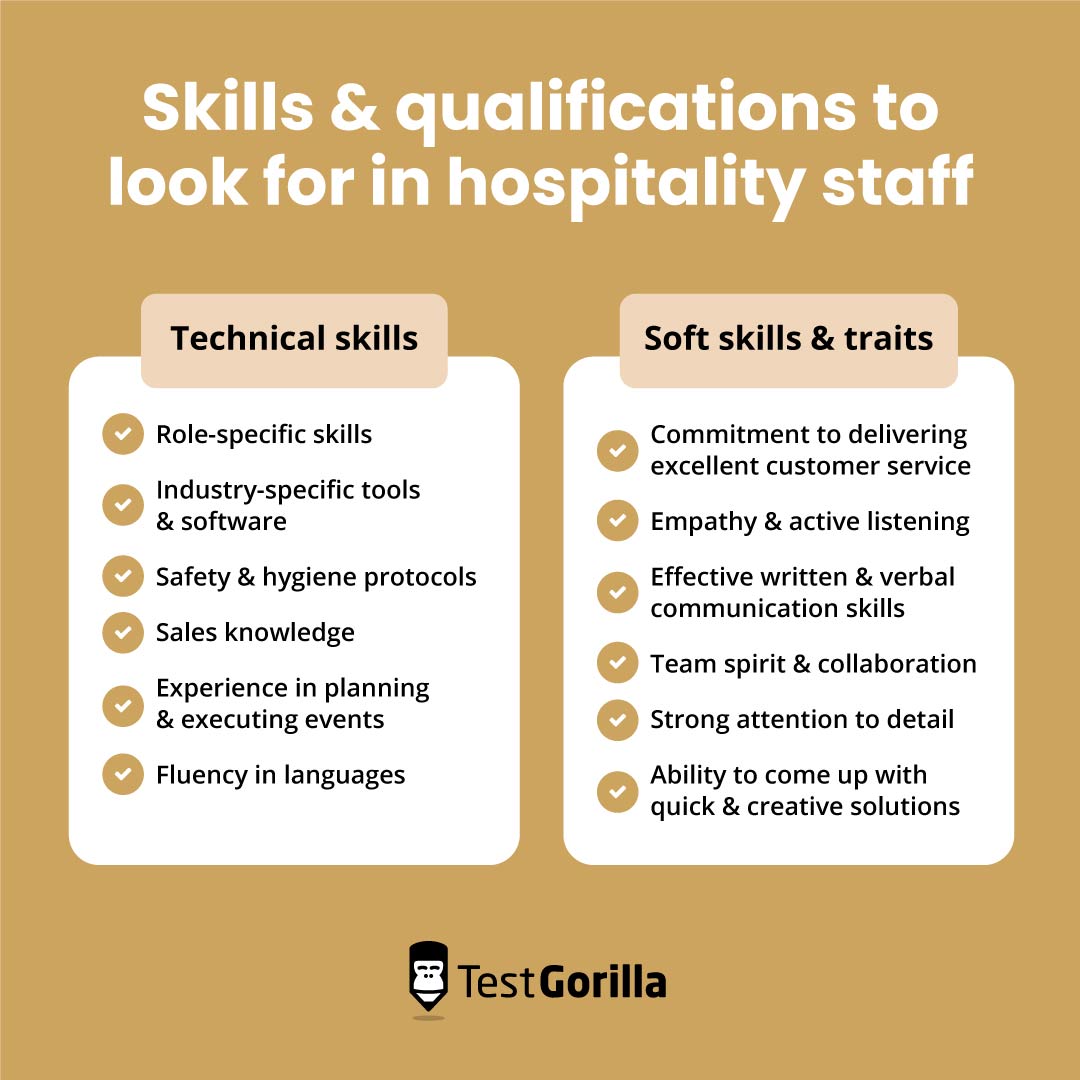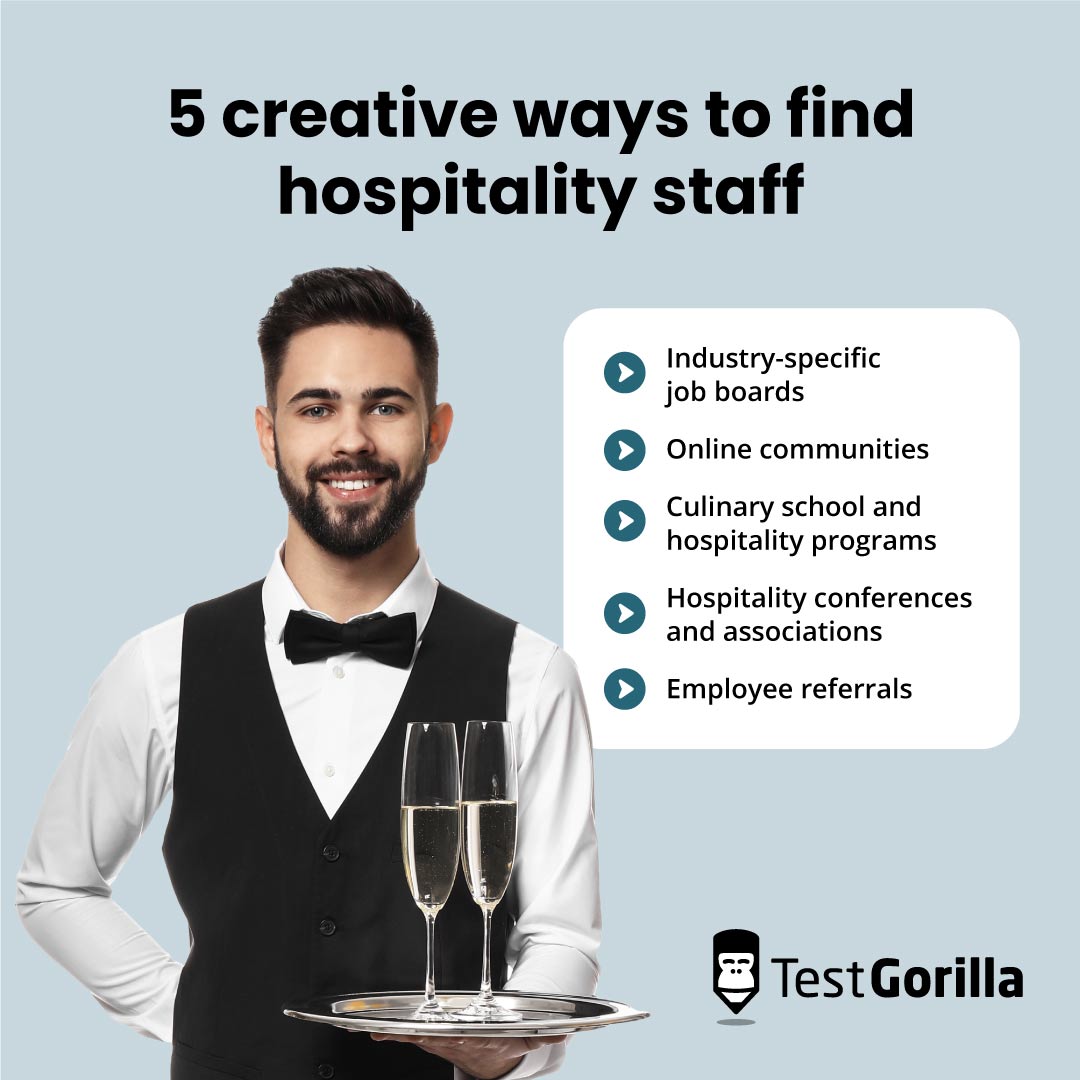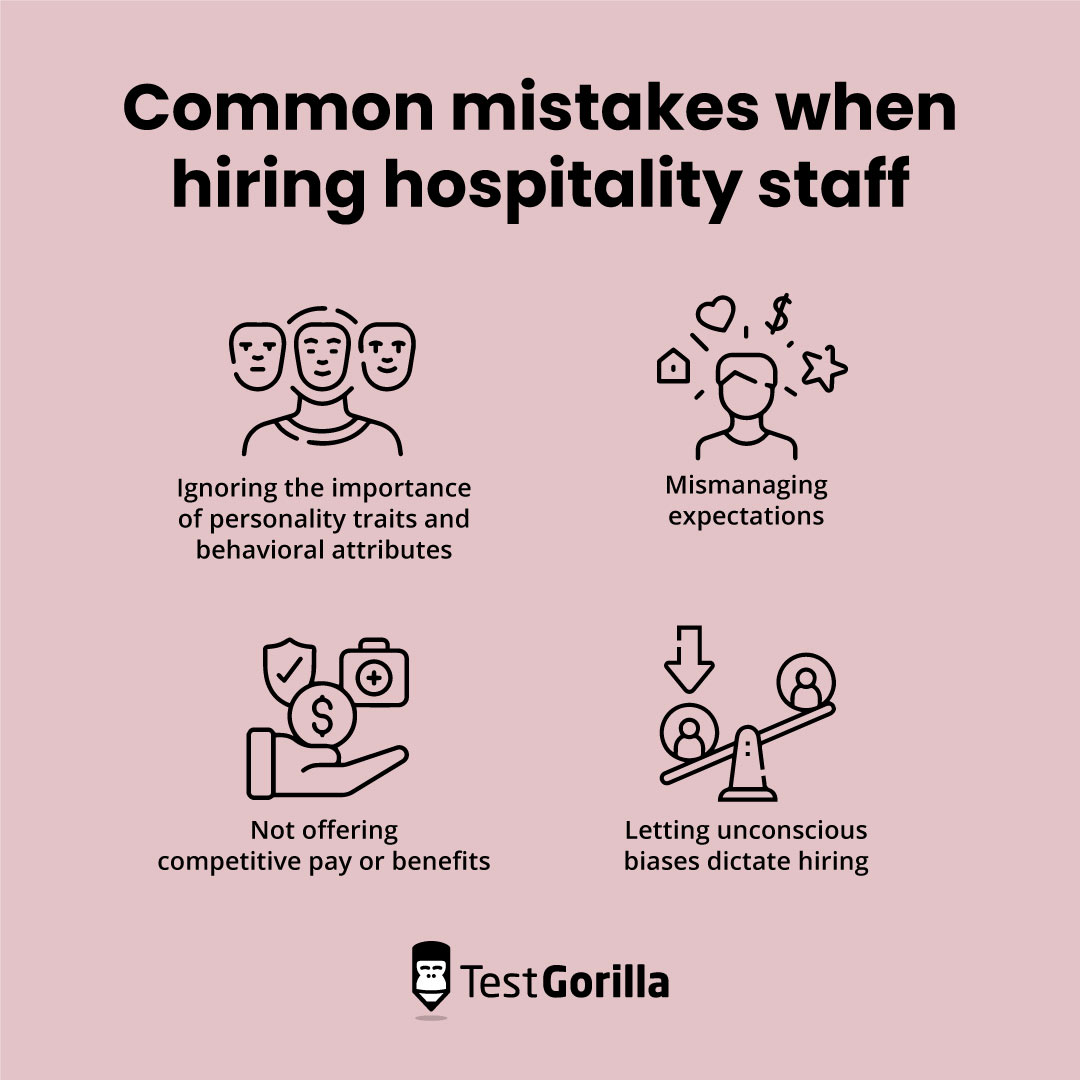Good staff members form the backbone of hospitality businesses. They run front-of-house operations, provide exceptional customer service, and even handle behind-the-scenes jobs like housekeeping.
But a single wrong hire in this job can ruin your guest experience and lower your chances of repeat business. Unfortunately, this isn’t uncommon.
Hospitality is a competitive space, and many recruiters settle for subpar candidates because they either struggle with attracting top talent or don’t know how to assess them thoroughly enough.
We’re here to make sure this doesn’t happen to you.
In this guide, we explain how to hire and assess hospitality staff. You’ll learn what skills to look for, where to source qualified candidates, and what common pitfalls to avoid so you can build a first-class hospitality team for your establishment.
Table of contents
- What you need to know before you hire hospitality staff
- Skills and qualifications to look for in hospitality staff
- Where to find hospitality staff
- How to select and assess hospitality candidates
- Common mistakes when hiring hospitality staff
- Attract and hire the best hospitality staff with TestGorilla
What you need to know before you hire hospitality staff
Think through the following factors before you start hiring your hospitality staff.
Decide what role you’re hiring for
Hospitality staff is a broad category that covers many types of roles. The specific hospitality staff role you’ll recruit for will depend on the factors below.
Nature of your business: The roles you want to fill will depend on your business. For instance, you’ll need housekeeping employees for a hotel or resort but not as part of your restaurant staff.
Existing talent gaps in your company: Evaluate what roles need to be filled by analyzing your current team’s skill set and looking at business demand. For example, if customers frequently have questions about your wine list, you may need to hire a wine sommelier to meet customer needs.
Industry trends: Look at market trends and competing establishments to ensure you’re investing in the right roles and not missing anything. For instance, guests are more focused on health and well-being than ever. Hiring an in-house wellness team could give you a competitive edge in the market.
Determine your non-negotiables
Think about what skills, attributes, or working styles are essential to your hospitality roles so you don’t hire someone who doesn’t have what it takes to succeed.
For instance, if you’re opening an establishment in a new region, you might need staff members who can communicate in the regional language and understand the cultural expectations of customers in that location.
Similarly, if you’re looking for someone to manage your hotel’s front desk, you’ll want a staff member with strong organizational skills, a customer-centric mindset, and the ability to multitask effectively.
Consider your budget for the role
Ensure you fully understand the costs and resources you’ll need to hire hospitality staff. Certain highly skilled jobs like chefs will cost you more than some other roles. You can find salary information for different roles on websites like Glassdoor.
You also need to think about employee benefits and perks, training and onboarding expenses, and other costs to the company so there are no unwanted surprises at the time of hiring.
Skills and qualifications to look for in hospitality staff
The specific skills you’ll need will depend on the nature of your business and what role you’re hiring for. However, the best hospitality staff candidates should possess the following key abilities and attributes.
Technical skills and knowledge
Role-specific skills, such as culinary expertise, bartending, service techniques, or housekeeping expertise
Proficiency in industry-specific tools and software, like point-of-sale (POS) software, property management systems (PMS), reservation platforms, and other technology relevant to the role
Deep knowledge of safety and hygiene protocols – from food preparation to housekeeping and guest services
Sales knowledge to upsell services, amenities, and additional offerings and increase revenue for the business
Experience in planning and executing events, which is crucial for most hospitality businesses, including banquets, hotels, restaurants, cruise ships, resorts, and more
Fluency in languages based on guest demographics
Soft skills and traits
Commitment to delivering excellent customer service by understanding and fulfilling customer requests, resolving issues promptly, and creating a positive experience
Empathy and active listening help to anticipate, identify, and address guest’s needs
Effective written and verbal communication skills to interact clearly with cross-functional teams, customers, and third parties
Team spirit and collaboration with different departments to ensure seamless operations provide exceptional service
Strong attention to detail to spot and address any issue that could hamper operations or negatively impact customer experience
Ability to come up with quick and creative solutions to customer-related or operational problems
The best insights on HR and recruitment, delivered to your inbox.
Biweekly updates. No spam. Unsubscribe any time.
Where to find hospitality staff
Finding the right hospitality staff takes work. Their skill set is transferable across multiple types of businesses, putting them in high demand.
Most hospitality companies post their open positions on job boards such as LinkedIn, Indeed, and Monster. These reach a large pool of applicants, but many may be unqualified for the role.
5 creative ways to find hospitality staff
Instead of sticking to standard job boards, try these five creative recruitment sources to find candidates with the skills and experience you’re looking for.
1. Industry-specific job boards
There are several websites dedicated to hospitality job postings, including HospitalityJobs.com and HCareers. You can post your open hospitality staff roles on these sites and connect with candidates from various sectors, including restaurants, hotels, travel, and more.
2. Online communities
Browse online networks like the Food and Beverage Hospitality Network on Linkedin and the r/Restaurateur community on Reddit. You can find and interact with hospitality professionals and even ask them to apply for open positions in your company.
3. Culinary school and hospitality programs
Hospitality schools are a breeding ground for top talent. Research schools in your area and speak to their career service or job placement departments to tap into a pool of students or recent graduates for your internship and entry-level positions.
4. Hospitality conferences and associations
Events like the Women in Travel & Hospitality Conference, Hospitality Upgrade’s Executive Vendor Summit, and more bring together professionals from the hospitality sector. You can also join niche associations such as the Events Industry Council. Attending these conferences and association events provides opportunities to meet potential candidates and showcase your establishment.
5. Employee referrals
Finally, implementing an employee referral program can help you attract skilled talent from your current staff members’ hospitality networks. Not only is this a reliable method of sourcing talent, but it also increases the likelihood that candidates will fit well into your company’s culture.
How to select and assess hospitality candidates
Once applications come in, you need to act quickly to assess them so you don’t lose out on top candidates.
Resume and cover letter screening are time-consuming and often prone to bias. Instead, consider putting candidates through online tests with a platform like TestGorilla.
The pre-employment screening tests below can help you select your best candidates quickly and effectively.
TestGorilla’s Hospitality Skill assessment evaluates candidates’ skills, knowledge, and decision-making abilities for entry to mid-level positions in the hospitality space
The Hospitality (Hotel Excl. Restaurant) test helps you assess and hire hospitality staff in the hotel industry
Our Restaurant Management test looks specifically at a candidate’s ability to manage a restaurant business
TestGorilla’s library of language tests determines if applicants are fluent in the language(s) required to interact effectively with customers and team members
Our Customer Service test checks for a customer-centric approach, communication skills, and the ability to provide guests with a positive guest experience
Personality assessments like the DISC and Enneagram tests help you identify if candidates have the behavioral traits required for the job
TestGorilla’s Attention to Detail test evaluates candidates’ ability to identify and correct even the most minor issues – which is crucial to providing a great guest experience
Common mistakes when hiring hospitality staff
Watch out for these pitfalls when recruiting for hospitality staff roles.
1. Ignoring the importance of personality traits and behavioral attributes
Technical expertise is crucial in many hospitality roles – particularly highly specialized ones like chefs and bartenders – but you can’t overlook the importance of soft skills.
Even the most skilled staff members can damage your guest experience if they lack the interpersonal skills to interact with customers, resolve issues quickly and diplomatically, collaborate with other teams at your business, and create a positive atmosphere.
2. Mismanaging expectations
Hospitality roles often involve late nights, travel, and other unconventional factors. It’s important to clearly outline these expectations in your hospitality staff job descriptions. Otherwise, you could end up hiring someone whose lifestyle doesn’t align with the needs of the job.
Imagine that you’ve hired an exceptional bartender. If they can’t work late night shifts – which is often required – you’ll have a big problem and need to start the hiring process from scratch.
3. Not offering competitive pay or benefits
Hospitality staff members – especially those in non-technical roles – often earn low wages. Plus, hospitality businesses experience higher turnover than other industries, with low pay and insufficient benefits cited as top reasons employees quit.
To ensure you attract and retain the best talent, offer your hospitality candidates competitive pay – ideally above the market average. Alternatively, consider offering employee benefits such as discounts, gym memberships, and flexible working.
4. Letting unconscious biases dictate hiring
Even the best recruiting teams are prone to bias when hiring for hospitality roles. For instance, one can assume that women are more warm and personable than men and therefore will provide better customer service as receptionists.
Similarly, recruiters might prefer “young and dynamic” event management staff and fail to focus on candidates who can bring fresh perspectives and ideas regardless of their age.
Letting these unconscious biases influence your decision-making limits your talented pool and could cost you some highly talented candidates.
To avoid this, implement structured hiring processes. Define the role’s requirements in advance, use standardized interview questions, consider blind hiring techniques like anonymizing parts of applications, and involve multiple team members in hiring decisions to get diverse perspectives.
Attract and hire the best hospitality staff with TestGorilla
Hospitality staff members can make or break your business. The best teams create a positive guest experience, encourage repeat business, and generate revenue. But, one wrong hire can hamper operations and damage your reputation with customers.
That’s why your hospitality staff hiring process needs to be solid and reliable. Use industry-specific job boards, communities, and employee referrals to attract the right talent.
TestGorilla’s online tests can then help you quickly and objectively evaluate candidates’ hard and soft skills and give you a holistic view of their suitability for the role before you make a final decision.
Sign up for your free TestGorilla plan, book a free 30-minute live demo with a TestGorilla team member, or take a product tour to get started.
You've scrolled this far
Why not try TestGorilla for free, and see what happens when you put skills first.

















